 Aberdeenshire
Aberdeenshire Angus
Angus Argyll & Bute
Argyll & Bute Ayrshire
Ayrshire Bedfordshire
Bedfordshire Berkshire
Berkshire Buckinghamshire
Buckinghamshire Cambridgeshire
Cambridgeshire Central Scotland
Central Scotland Cheshire
Cheshire Cornwall
Cornwall Cumbria
Cumbria Derbyshire
Derbyshire Devon
Devon Dorset
Dorset Dumfries & Galloway
Dumfries & Galloway Durham
Durham East Sussex
East Sussex East Yorkshire
East Yorkshire Edinburgh & Lothian
Edinburgh & Lothian Essex
Essex Fife
Fife Glasgow
Glasgow Gloucestershire
Gloucestershire Greater Manchester
Greater Manchester Hampshire
Hampshire Herefordshire
Herefordshire Hertfordshire
Hertfordshire Highlands
Highlands Inverness-shire
Inverness-shire Kent
Kent Lancashire
Lancashire Leicestershire
Leicestershire Lincolnshire
Lincolnshire Lochaber
Lochaber London
London Merseyside
Merseyside Midlands
Midlands Norfolk
Norfolk North Wales
North Wales North Yorkshire
North Yorkshire Northamptonshire
Northamptonshire Northumberland
Northumberland Nottinghamshire
Nottinghamshire Orkney Islands
Orkney Islands Oxfordshire
Oxfordshire Perthshire
Perthshire Scottish Borders
Scottish Borders Shetland Islands
Shetland Islands Shropshire
Shropshire Somerset
Somerset South Wales
South Wales South Yorkshire
South Yorkshire Staffordshire
Staffordshire Suffolk
Suffolk Surrey
Surrey Tyne & Wear
Tyne & Wear Warwickshire
Warwickshire West Sussex
West Sussex West Yorkshire
West Yorkshire Western Islands
Western Islands Wiltshire
Wiltshire Worcestershire
Worcestershire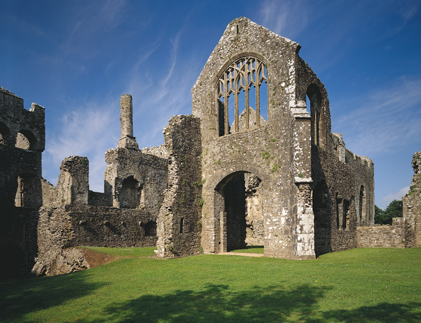
Lamphey Bishop's Palace was the retreat of choice for those medieval bishops seeking solace from the everyday stresses of Church and State. The medieval bishops of St Davids were worldly men who enjoyed the privileges of wealth, power and status. Lam...

Learn all about England’s oldest recorded town with City Sightseeing Colchester. Journey through Colchester’s streets and become absorbed in the town’s unique heritage and history. Colchester today is a thriving, modern town with many great...

Cressing Temple takes its unusual name from the medieval monks of the Knights Templar who founded the two vast 13th century timber barns, which form the centrepiece of this delightful rural estate. The Tudor Walled Garden is inspired by an age wh...
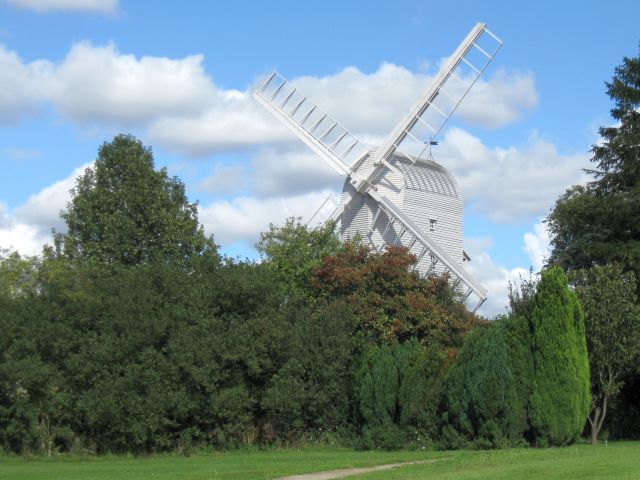
Finchingfield Windmill is a small, simple, mid-18th century feudal or estate-type postmill with a wooden wind shaft and 1 pair of stones....
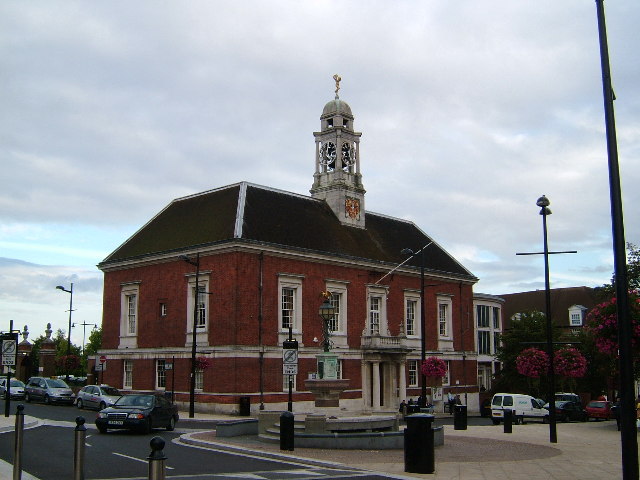
The Town Hall is without doubt one of the town's most beautiful buildings. Donated to the people of Braintree by the Courtauld family in 1928, this Georgian style building is steeped in history and provides a perfect environment for all sorts of occ...

Since St Katherines became The Heritage Centre it has become the home of Art, Camera, Needlework and Patchwork Groups as well as an historical group. They have Art, Hobbies, Militaria and Photographic Exhibitions. There is a Lifeboat Week as well as ...
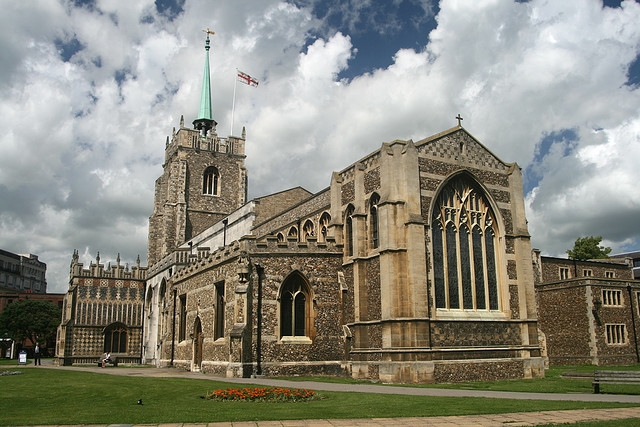
Chelmsford Cathedral is no vast, vaulted hall. Its qualities are more jewel like: small, light, colourful, precious and cherished. When you walk in the building it seems to welcome you. It lifts the spirit and its silence sings. Although we receiv...
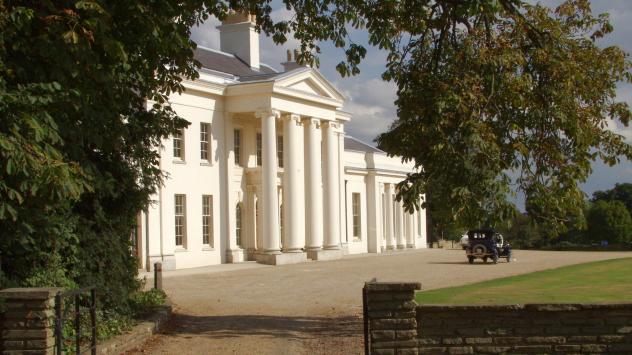
Hylands House, in Chelmsford, Essex, is a stunning Grade II* listed property, spectacularly restored to its former glory and situated in 574 acres of historic landscaped parkland....

Aythorpe Roding Windmill was built before 1770 and worked until 1936. It has been restored to working order by Essex County Council and ground corn in 1982. There is evidence that the mill was comprehensively modernised late in the 19thC....
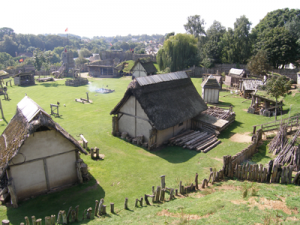
Mountfitchet Castle is a Norman Motte and Bailey Castle and Village, re-constructed on its original historic ancient site, complete with many different buildings, siege weapons and animals roaming freely throughout the 10 acre site, providing a uniqu...
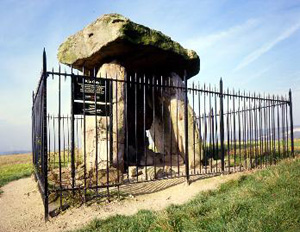
The remains of two megalithic 'dolmen' burial chambers. Impressive Kit's Coty has three uprights and a massive capstone: Little Kit's Coty, alias the Countless Stones, is now a jumble of sarsens....

This great abbey, marking the rebirth of Christianity in southern England, was founded in AD 597 by St Augustine. Originally created as a burial place for the Anglo-Saxon kings of Kent, it is part of the Canterbury World Heritage Site, along with the...
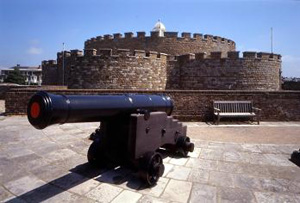
For a fascinating day out on the Kent coast look no further than Deal Castle. Built by the order of King Henry VIII it is one of the finest Tudor artillery castles in England, and among the earliest and most elaborate of a chain of coastal forts, ...

The flint-walled 13th-century chapel and hall of a 'Commandery' of Knights Hospitallers, later converted into a farmhouse. It has a remarkable medieval crown post roof and 16th-century ceilings with moulded beams. ...
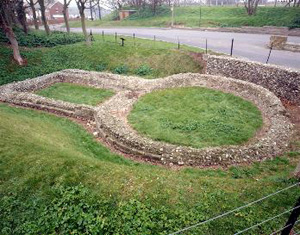
The foundations of a small medieval church, traditionally the site of King John's submission to the Papal Legate in 1213....
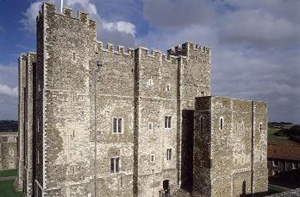
The History of Dover Castle Commanding the shortest sea crossing between England and the continent, Dover Castle has a long and immensely eventful history. Many centuries before King Henry II began the great stone castle here in the 1160s, its...
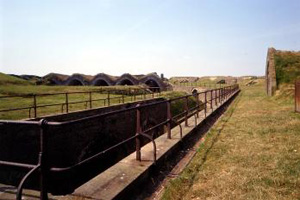
Western Heights is a huge fortification which begun during the Napoleonic Wars and completed in the 1860s, designed to protect Dover from French invasion. Only the moat can be visited....

It was at Down House that Charles Darwin worked on his scientific theories, and wrote On the Origin of Species by Means of Natural Selection. The book which both scandalised and revolutionised the Victorian world when it was published in 1859. ...

Fully restored and re-equipped with its cannon, this is one of 103 ingeniously-designed artillery towers, built at vulnerable points around the south and east coasts to resist threatened Napoleonic invasion....
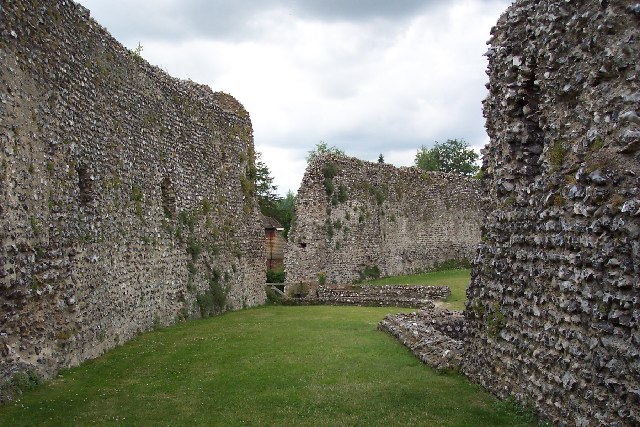
The remains of one of the earliest Norman stone castles, built c. 1100 and little changed afterwards, including the full-height motte wall and part of the hall.
...

Lullingstone Roman Villa is among the most outstanding Roman villa survivals in Britain, Lullingstone provides a unique all weather family day out. Set in the attractive surroundings of the Darent Valley in Kent, the villa was begun in about AD 100, ...

The ruins of the small Anglo-Saxon and medieval chapel of Stone-next-Faversham - the only Christian building in England to incorporate within its fabric the remains of a 4th century Romano-British pagan mausoleum. It lay close to the probable site...
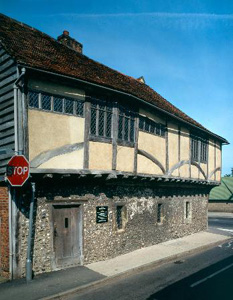
Originating as a 13th-century wayside hospital, this flint and timber-framed building now displays Roman artefacts from nearby sites....
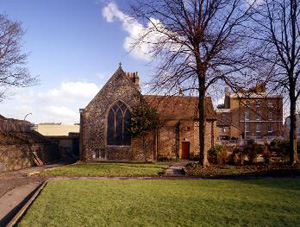
Milton Chantry is the oldest building in the Borough of Gravesham, it was founded in 1322 by Aymer de Valence, Earl of Pembroke and is situated within the Fort Gardens. The Chantry offers a wonderful insight into the heritage of the Borough of Gra...
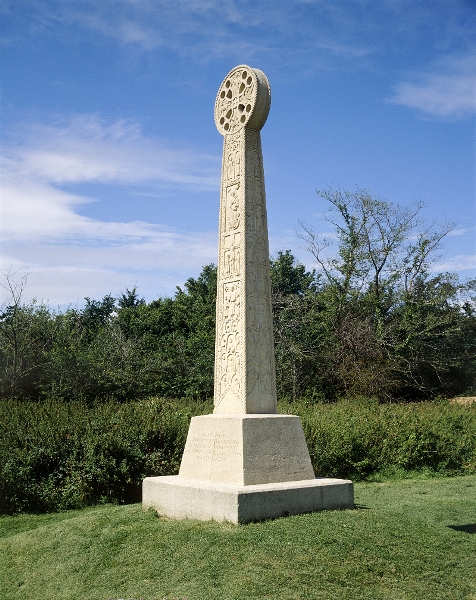
This 19th-century cross of Saxon design marks what is traditionally thought to have been the site of St Augustine's landing on the shores of England in AD 597. Accompanied by 30 followers, Augustine is said to have held a mass here before moving ...

Reculver Towers and Roman Fort is an imposing landmark, the twin 12th-century towers of the ruined church stand amid the remains of an important Roman 'Saxon Shore' fort and a Saxon monastery. Richborough Roman Fort is nearby....

Strategically placed astride the London Road, guarding an important crossing of the River Medway, this imposing fortress has a complex history of destruction and rebuilding. Today it stands as a proud reminder of the history of Rochester along with ...

The Richborough Roman Amphitheatre is evocatively sited amid the East Kent marshes, Richborough is perhaps the most symbolically important of all Roman sites in Britain, witnessing both the beginning and almost the end of Roman rule here. Explore...

Part of a manor house of the Knights Templar, built in about 1240, with a fine first floor hall displaying traces of wall paintings....

The ruins of a 12th-century stone keep, with panoramic views over the Weald....
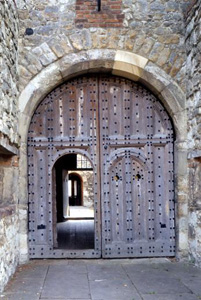
Upnor Castleis set in tranquil grounds adjoining a riverside village, this rare example of an Elizabethan artillery fort was begun in 1559 and redeveloped in 1599-1601, to protect warships near the new Chatham dockyards. It entirely failed to do ...
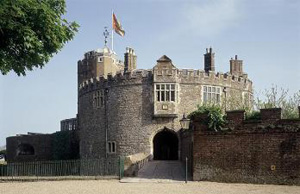
Built during the reign of King Henry VIII, Walmer Castle is one of the most fascinating visitor attractions in the South East. Originally designed as part of a chain of coastal artillery defences it evolved into the official residence of the Lord Wa...
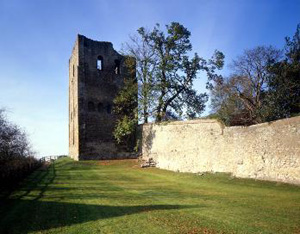
This early and well-preserved example of a small free-standing Norman tower keep is located on a natural sandstone ledge near the head of a narrow valley. Rising almost to its original height, this mysterious survival takes its name from a chapel of ...
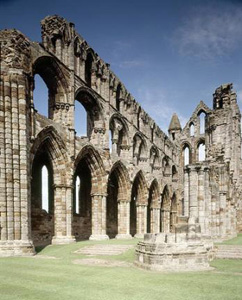
Set on a headland high over the popular seaside town, Whitby Abbey is the perfect choice for a great value day trip in Yorkshire. It's easy to see how Bram Stoker was inspired by its gothic splendour when writing Dracula. This is one of the most atmo...
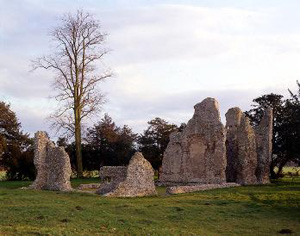
Weeting Castle are now the ruins of what was a substantial early medieval manor house surrounded by a shallow, rectangular moat....

Winshields Wall (Hadrian's Wall) is the highest point on the Wall, in rugged country with spectacular views....

Bant's Carn Burial Chamber and Halangy Down Ancient Village are now the remains of an ancient Iron Age village in a wonderfully scenic location. On the hill above stands a Bronze Age burial mound with entrance passage and inner chamber....
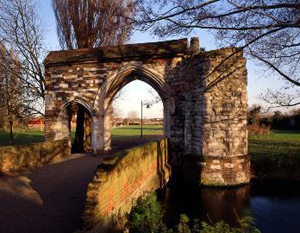
Explore the fascinating remnants of one of the great monastic foundations of the Middle Ages at this important site, based in the historic market town of Waltham Abbey. With origins dating back to the early 11th century, the site adopted many rel...

Easby Abbey are now the substantial remains of an abbey of Premonstratensian 'white canons', probably most notable for its lavish roof-height refectory of c. 1300 and other monastic buildings. Within the precinct is the still-active parish church,...

St Paul's Monastery is the home of the Venerable Bede, chronicler of the beginnings of English Christianity, Jarrow has become one of the best-understood Anglo-Saxon monastic sites. St Paul's Monastery is an old Anglo-Saxon church - with the oldes...

Fragments of the church and monastic buildings of the first Cistercian abbey in England. Waverley Abbey was founded in 1128....

Kirkham House is a late medieval stone house, afterwards split into three cottages, was restored in the 1960s. Kirkham House is furnished with modern furniture, illustrating traditional craftsmanship and the original use of the rooms. Guided t...
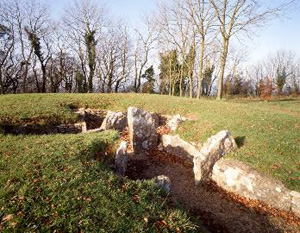
Nympsfield Long Barrow is a large Neolithic burial mound with spectacular vistas over the Severn Valley. Nympsfield Long Barrow internal burial chambers are uncovered for viewing....

Penhallam Manor House is the site of a medieval manor house surrounded by a protective moat. It was designated as a Scheduled Monument in 1996 and is now in the guardianship of English Heritage. The site is a grass-covered ruin showing the comple...
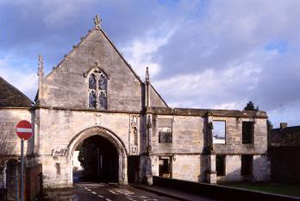
Kingswood Abbey Gatehouse is a 16th-century gatehouse, one of the latest monastic buildings in England. Kingswood Abbey Gatehouse displays a richly sculpted mullioned window. It is the sole survivor of this Cistercian abbey....
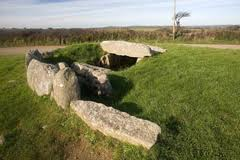
Tregiffian Burial Chamber in Cornwall is a Neolithic or early Bronze Age chambered tomb with an entrance passage, walled and roofed with stone slabs, leading into the central chamber....

Mattersey Priory are now the remains, of mainly the 13th-century refectory and kitchen, of a small monastery for just six Gilbertine canons - the only wholly English monastic order....
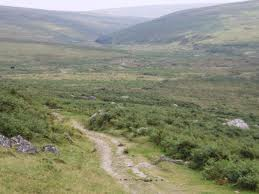
Some 300 Bronze Age and medieval sites, covering 15.5 square kilometres (6 square miles) of Dartmoor landscape, 4 miles E of Yelverton....
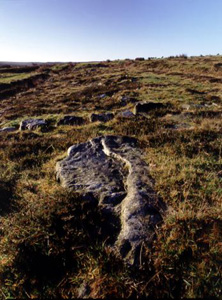
Wheeldale Roman Road is a mile-long stretch of Roman road across the moors, still with its hard core and drainage....
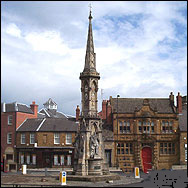
The town of Banbury in Oxfordshire dates back much further than the nursery rhyme dedicated to it. Until a few years ago the first signs of habitation in the area went back to a Roman villa at Wykham Park from the period around 250AD. However in ...

Merrivale Prehistoric Settlement are now the remains of a Bronze Age settlement, side by side with a 'ritual landscape' of sacred sites - three stone rows, a stone circle, standing stones and burial cairns - probably constructed over a long period be...

The remains of Christchurch Castle include parts of the mound-top keep, and more unusually the 12th-century riverside chamber block or 'Constable's House'. This very early example of domestic architecture includes a rare Norman chimney....
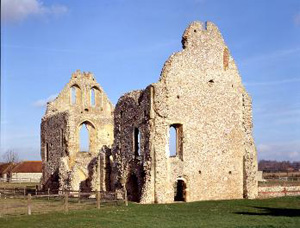
Boxgrove Priory guest house and other remains of a Benedictine priory: much of the fine 12th to 14th- century monastic church survives as the parish church....
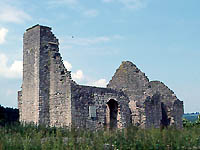
Runston Chapel is a small roofless chapel, established early in the twelfth century....

Dupath Well is a charming well-house, built about 1500, stands over an ancient spring, believed to cure whooping cough. Dupath Well was built by the Augustinian canons of nearby St Germans priory, it houses the remains of an immersion pool for cu...
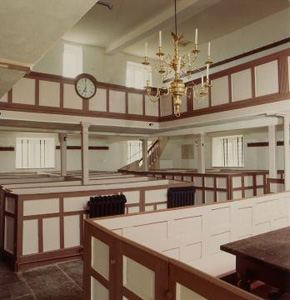
Goodshaw Chapel is the English Heritage's only Nonconformist place of worship, this atmospheric Baptist chapel displays a complete set of box-pews, galleries and pulpit dating from c. 1742 to 1809....

Notgrove Long Barrow is a grassed-over Neolithic long barrow containing stone-lined burial chambers, on the crest of a high Cotswold ridge....
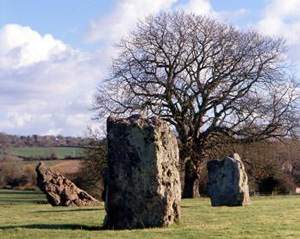
Although Stanton Drew Circles is the third largest collection of prehistoric standing stones in England, the three circles and three-stone 'cove' of Stanton Drew are surprisingly little-known. Recent surveys have revealed that Stanton Drew Circles...

Belas Knap Long Barrow is a good example of a Neolithic long barrow, with the mound still intact and surrounded by a stone wall. Belas Knap Long Barrow chamber tombs where the remains of 31 Stone Age people were found, have been opened up so that vi...

Steeton Hall Gateway is a fine example of a small, well-preserved gatehouse dating from the 14th century....
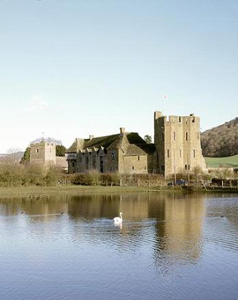
Stokesay Castle is quite simply the finest and best preserved fortified medieval manor house in England. Set in peaceful countryside near the Welsh border, the castle, timber-framed gatehouse and parish church form an unforgettably picturesque group....

Netheravon Dovecote is a charming 18th-century brick dovecote, still with most of its 700 or more nesting boxes....

Woodhenge is a neolithic monument, dating from about 2300 BC, with concrete markers replacing six concentric rings of timber posts, once possibly supporting a ring shaped building....

Silbury Hill is the largest man-made mound in Europe, huge and mysterious Silbury Hill is comparable in height and volume to the roughly contemporary Egyptian pyramids. Probably completed by about 2350 BC and part of the Avebury 'sacred landscape', i...

Ludgershall Castle and Cross ruins and earthworks are of a royal castle dating mainly from the 12th and 13th centuries, frequently used as a hunting lodge. The remains of the medieval cross stand in the centre of the village....
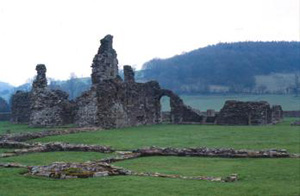
Whalley Abbey Gatehouse is a 14th-century gatehouse of the nearby Cistercian abbey, the second wealthiest monastery in Lancashire, beside the River Calder. The first floor was probably a chapel....
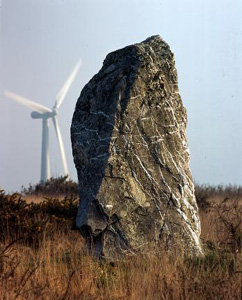
St Breock Downs Monolith in Saint Breock, Cornwall was originally 5 metres (16 ft) high and weighing some 16.75 tonnes. St Breock Downs Monolith is Cornwall's largest and heaviest prehistoric monolith. It stands on the summit of the St Breock Down...
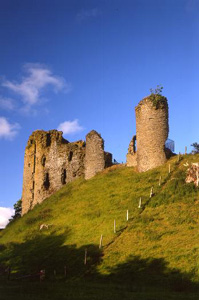
Clun Castle's dramatic riverside ruins and extensive earthworks of a Welsh Border Norman castle, its tall keep unusually set on the side of its mound....

Old Oswestry Hill Fort is the most hugely impressive Iron Age hillfort on the Welsh Borders, covering 40 acres, with formidable multiple ramparts....

Sewingshields Wall (Hadrian's Wall) is a length of Wall with milecastle remains, impressively sited along the Whin Sill, commanding fine views of many prehistoric and later earthworks to the north....

Cawfields Roman Wall (Hadrian's Wall) is a fine stretch of Hadrian's Wall on a steep slope, with turrets and an impressive milecastle, probably built by the Second Legion....

Berney Arms Windmill is one of Norfolk's best and largest extant marsh mills, built to grind a constituent of cement and, in use until 1951, finally pumping water to drain surrounding marshland....

Near Carrawburgh fort stands a fascinating temple to the eastern god Mithras, with facsimiles of altars found during excavation. Temple of Mithras (Hadrian's Wall) is sited like many Mithraic temples near a military base, it was founded in the 3rd...

Brunton Turret (Hadrian's Wall) is a wall section and a surviving piece of turret 2 1⁄2 metres (8.2 feet) high, built by men of the Twentieth Legion....

In 1290 Eleanor of Castile, the beloved wife of Edward I and mother of his 14 children, died at Harby in Nottinghamshire. The places where her body rested on the journey south to its tomb in Westminster Abbey were marked by stone crosses. The sta...

Black Carts Turret (Hadrian's Wall) is a 460-metre (1,509 feet) length of Hadrian's Wall including one turret. Please note: It is not possible for visitors to park here at Black Carts Turret (Hadrian's Wall)....

Offa's Dyke is a three-mile section of the great earthwork boundary dyke built along the Anglo-Welsh border by Offa, King of Mercia, probably during the 780s. This especially impressive wooded stretch includes the Devil's Pulpit, with fine views o...
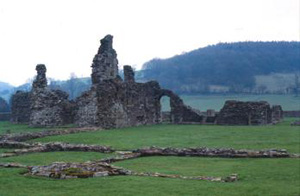
Sawley Abbey are now the remains of a Cistercian abbey founded in 1148, set on the banks of the Ribble against a backdrop of dramatic hills. After Sawley Abbey's dissolution in 1536, the monks were briefly returned to the abbey during the Pilgrima...

Wharram Percy Deserted Medieval Village asre the most famous and intensively studied of Britain's 3,000 or so deserted medieval villages, Wharram Percy occupies a remote but attractive site in a beautiful Wolds valley. Above the substantial ruins ...

Bramber Castle are now the remains of a Norman castle on the banks of the River Adur, founded by William de Braose c. 1075. The Bramber Castle earthworks are dominated by a towering wall of the keep gatehouse....

The riverside ruins of Edlingham Castle are, principally the solar tower, of a manor house progressively fortified against the Scots during the 14th century. History of Edlingham Castle By 1174, a manor house at the location was in the poss...

Nine Ladies Stone Circle is a small but apparently complete early Bronze Age stone circle of nine stones, part of a complex of prehistoric circles and standing stones on Stanton Moor....

Bolsover Cundy House is a charming cottage-like 17th-century conduit house once supplied water to Bolsover Castle. Bolsover Cundy House has recently been restored, including its vaulted stone-slab roof....

The White Ladies Priory remains of a late 12th-century church of a small priory of Augustinian canonesses, surrounded by picturesque woodland....
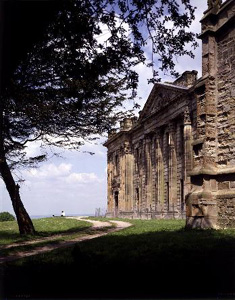
Sutton Scarsdale Hall is now the imposing shell of a grandiose Georgian mansion built in 1724, with an immensely columned exterior. Roofless since c. 1920, when its interiors were dismantled and some exported to America: but there is still much to di...

Hob Hurst's House is a square prehistoric burial chamber with an earthwork ditch and outer bank. Hob Hurst's House is named after a local goblin....
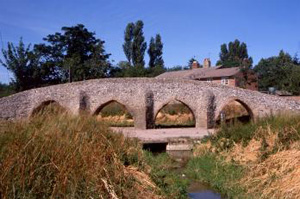
Moulton Packhorse Bridge is a pretty four-arched 15th-century bridge, spanning the River Kennet on the old route from Cambridge to Bury St Edmunds....

Stoney Littleton Long Barrow is one of the finest accessible examples of a Neolithic chambered tomb, with its multiple burial chambers open to view....
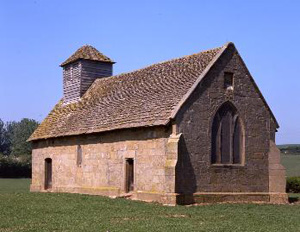
Langley Chapel is a small chapel tranquilly set all alone in charming countryside. Its atmospheric interior contains a perfect set of 17th-century timber furnishings, including a musicians' pew....

Cantlop Bridge is a single-span, cast-iron road bridge over the Cound Brook. Designed by the great engineer Thomas Telford, who was instrumental in shaping industrial Shropshire and the West Midlands....
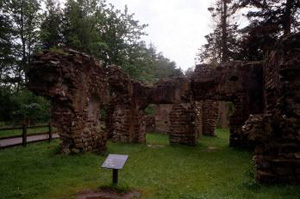
The remains of the bath house of Ravenglass Roman fort, established in AD 130, are among the tallest Roman structures surviving in northern Britain: the walls stand almost 4 metres (13 feet) high. The fort at Ravenglass (whose earthworks can be seen...
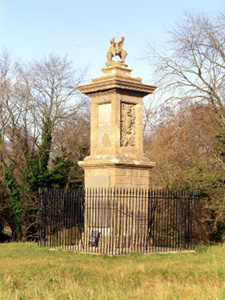
Sir Bevil Grenville's Monument was erected to commemorate the heroism of a Royalist commander and his Cornish pikemen at the Battle of Lansdown, 1643....

Bradford-on-Avon Tithe Barn is a spectacular medieval monastic barn with slate roof and wooden-beamed interior....

Nunney Castle i9s the striking and picturesque moated castle of Nunney was built in the 1370s by Sir John de la Mere, who had seemingly served in the French wars. Certainly it was designed in the latest French style, resembling a miniature version...
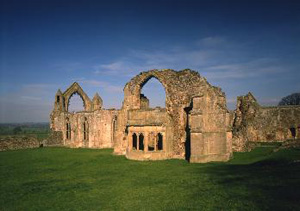
Haughmond Abbey are now the extensive remains of an Augustinian abbey, including its abbots' quarters, refectory and cloister. The substantially surviving chapter house has a frontage richly bedecked with 12th and 14th century carving and statuary, ...
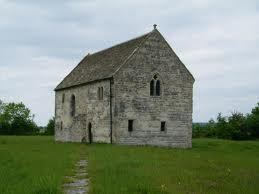
Meare Fish House is the only surviving monastic fishery building in England, this housed the Abbot of Glastonbury's water bailiff and provided facilities for fish-salting and drying....
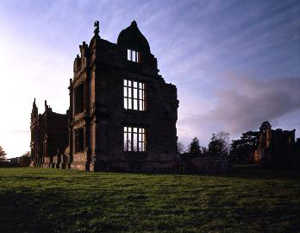
Moreton Corbet Castle are the ruins of the medieval castle and Tudor manor house of the Corbets are dominated by the theatrical shell of an ambitious Elizabethan mansion wing in Italianate style, which was devastated during the Civil War. Fine Corbet...
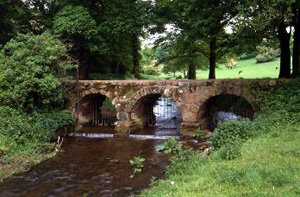
Bow Bridge is a narrow 15th-century stone bridge across Mill Beck carried an old pack-horse route to nearby Furness Abbey....
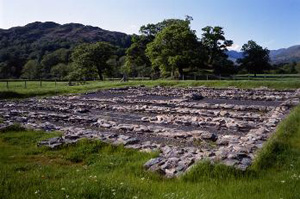
The Ambleside Roman Fort is a well-marked remains of a 2nd-century fort with large granaries, probably built under Hadrian to guard the Roman road from Brougham to Ravenglass and act as a supply base....

Piercebridge Roman Bridge are the remains of a Roman bridge, which once led to Piercebridge Roman Fort....

The earthworks forming Deddington Castle lie in a rural location to the south-east of the village of Deddington. No stonework is visible above ground today, but the site is nevertheless a striking one owing to the scale of the earthworks – the ...
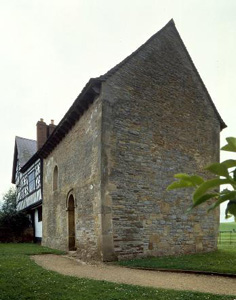
Odda's Chapel is one of the most complete surviving Saxon churches in England, this chapel was built in 1056 by Earl Odda, and rediscovered in 1865 subsumed into a farmhouse. Nearby is the equally famous Saxon parish church....
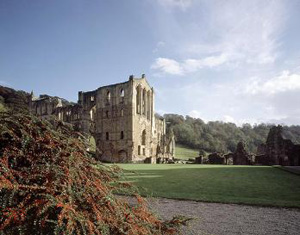
'Everywhere peace, everywhere serenity, and a marvellous freedom from the tumult of the world.' These words, written over eight centuries ago by the monastery's third abbot St Aelred, could describe Rievaulx today. Rievaulx Abbey is set in a beaut...
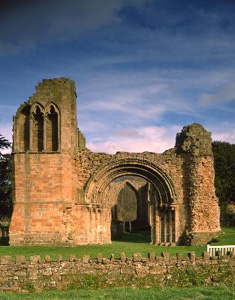
The founding community was brought to Lilleshall Abbey from Dorchester Abbey in Oxfordshire and, as at Dorchester, for a time the canons followed the specific customs and daily religious observance of the important Augustinian monastery at Arrouaise ...
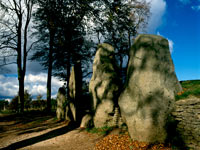
Wayland's Smithy is an atmospheric historic site situated approximately 2km along the Ridgeway from the Uffington White Horse. A Neolithic chambered long barrow, it was once believed to have been the habitation of the Saxon smith-god Wayland. ...
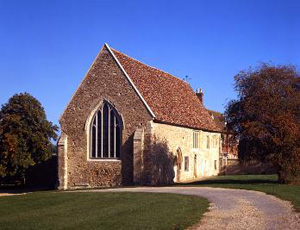
Bushmead Priory is a rare survival of the complete refectory of an Augustinian priory, with fine timber roof and notable 14th-century wall paintings....
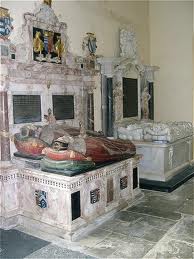
Among the largest sepulchral chapels attached to any English church, this cruciform mausoleum houses a remarkable sequence of 17 sculpted and effigied monuments spanning nearly three centuries (1615-1899), to the De Grey family of Wrest Park....

Houghton House today is the shell of a 17th century mansion commanding magnificent views, reputedly the inspiration for the ‘House Beautiful’ in John Bunyan’s Pilgrim’s Progress. It was built around 1615 for Mary, Dowager Countess of Pemb...

Hurlers Stone Circles in Liskeard, Cornwall has three fine late Neolithic or early Bronze Age stone circles arranged in a line, a grouping unique in England. Probably the best examples of ceremonial circles in the south west, they are traditionally t...

Trethevy Quoit is located high on the moors, overlooking a meeting of streams near St Cleer, this impressive quoit is known locally as the ‘giant’s house’ and, although a sweet image, John Norden’s 16th century description of “a little hows...

Ballowall is a strange and possibly unique example of a prehistoric funerary cairn which incorporates multiple phases of use and funerary practice spanning the Neolithic and Middle Bronze Age periods. Sited on Ballowall Common overlooking the rugged ...

Carn Euny is an archaeological site near Sancreed, on the Penwith peninsula in Cornwall, United Kingdom with considerable evidence of both Iron Age and post-Iron Age settlement. Excavations on this site have shown that there was activity at Carn Euny...

One of the most advanced of the artillery fortresses built by Henry VIII: used as a prison for eminent 17th-century captives, and later strengthened during the 19th and 20th centuries. It commands the narrow entrance to the Solent.
...
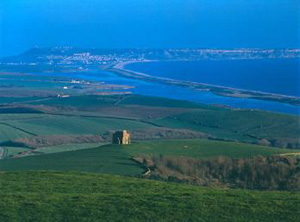
Set high on a hilltop overlooking Abbotsbury Abbey, this sturdily buttressed and barrel-vaulted 14th-century chapel was built by the monks as a place of pilgrimage and retreat....

Part of a monastic building, perhaps the abbot's lodging, of Bendictine Abbotsbury abbey. St Catherine's Chapel is within half a mile....

The striking twin-towered 14th- century gatehouse of this castle, later the focus of a Civil War siege and battle, survives amid impressive earthworks.
...
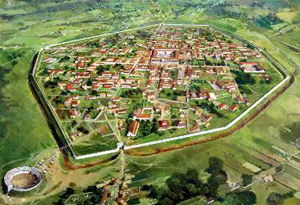
In the Iron Age, the region in which Silchester is located was part of the tribal territory of the Atrebates. During the Roman period their tribal centre became known as Calleva Atrebatum, growing into a substantial settlement of over 400,000 square ...

Three Bronze Age burial mounds, including the largest and finest 'disc barrow' in Hampshire, once part of a larger 'barrow cemetery'....
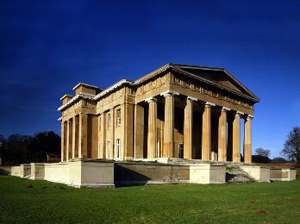
Set like a lakeside temple in a landscaped park, Northington Grange is the foremost example of the Greek Revival style in England. Created between 1804 and 1809 when William Wilkins encased an earlier house in Classical facades, most strikingly the '...

Begun as a 12th-century Norman keep and bailey castle, the palace was the chief residence of the Bishops of Winchester. Situated next to Winchester Cathedral, its extensive ruins reflect their importance and wealth. The last great occasion at Wolvese...

The ruins of a medieval palace (together with later additions) used by the bishops and senior clergy of Winchester as they travelled through their diocese. Winchester was the richest diocese in England, and its properties were grandiose and extravaga...
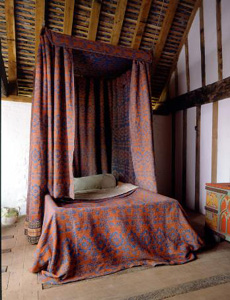
John Fortin, a merchant who traded with Bordeaux, started building this house c. 1290. A residence and place of business, it stood on one of the busiest streets in medieval Southampton. It has now been restored to its mid-14th-century appearance by t...
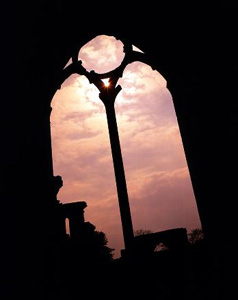
The most complete surviving Cistercian monastery in southern England, with almost all the walls of its 13th and 14th-century church still standing, along with many monastic buildings. Though under royal patronage, maritime Netley was never wealthy, a...

This artillery fort, built by Henry VIII to defend the sea passage to Southampton, was recently used as a Navy and RAF base....
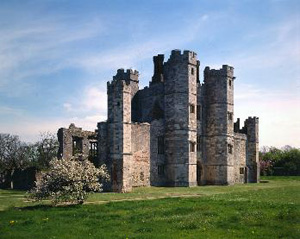
Titchfield Abbey is a medieval abbey and later country house, located in the village of Titchfield near Fareham in Hampshire, England. The abbey was founded in 1222 for Premonstratensian canons, an austere order of priests. The abbey was a minor hous...

Portchester can be considered a complete history of England in one place. First used by the Romans as a base from which they could clear the sea of barbarian raiders, it became a Saxon settlement from the middle of the 5th century until the end of th...

Royal Garrison Church was constructed around 1212 as a hospital. Although the church was badly damaged in a 1941 fire-bomb raid on Portsmouth, the chancel was saved.
...
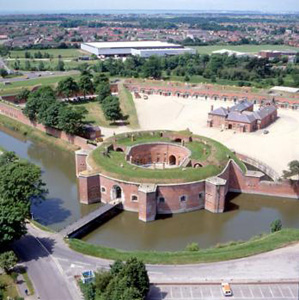
One of a number of forts built in the 1850s and 1860s to protect Portsmouth and its vital harbour against a French invasion. Largely unaltered, the parade ground, gun ramps and moated keep can all be viewed. The fort currently stores a treasure tro...

Two ornamental gateways, once part of Portsmouth's defences. King James's Gate (of 1687) has been moved, but Landport Gate, designed by Hawksmoor (1760) as the principal entrance to Portsmouth, remains in its original position....

Hadleigh Castle and Country Park is set in the romantic ruins of a royal castle overlooking the Essex marshes. Hadleigh was begun in about 1215 by Hubert de Burgh, but extensively refortified by Edward III during the Hundred Years War, becoming a...
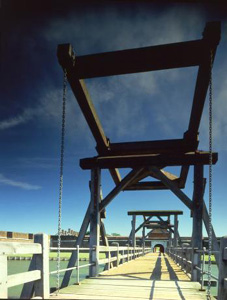
Tilbury Fort on the Thames estuary has protected London’s seaward approach from the 16th century through to the Second World War. Henry VIII built the first fort here, and Queen Elizabeth I famously rallied her army nearby to face the threat of ...
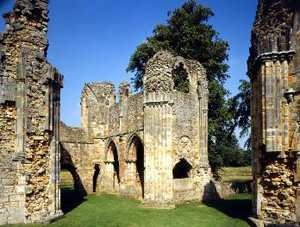
Bayham Old Abbey is an impressive ruin of an abbey of Premonstratensian 'white canons', on the Kent-Sussex border. They include much of the 13th to 15th-century church, the chapter house, and a picturesque 14th-century gatehouse. Now set in an ...
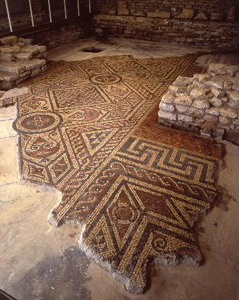
North Leigh Roman Villa are now the remains of a large, well-built Roman courtyard villa. The most important feature of North Leigh Roman Villa is a near complete mosaic tile floor, patterned in reds and browns....
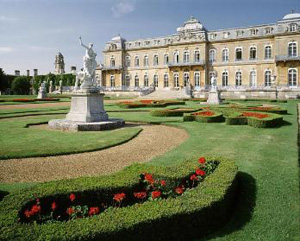
After decades behind virtually closed doors, its treasures overgrown and largely unknown, English Heritage is reviving one of Britain's largest and most important 'secret gardens' - Wrest Park in Bedfordshire. This is a wonderful 90-acre historic...
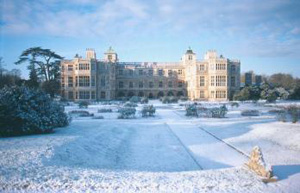
Sir Thomas Audley was given the lands of Walden Abbey by Henry VIII, and adapted the abbey buildings as his mansion. His grandson Thomas, first Earl of Suffolk, rebuilt this mansion between 1610 and 1614. The new Audley End was truly palatial in s...
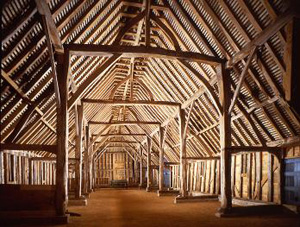
One of the finest surviving medieval barns in eastern England, tree-ring dated to the mid-15th century, with a breathtaking aisled interior and crown post roof, the product of some 400 oaks....
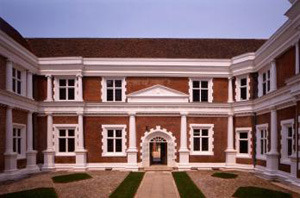
This fine Elizabethan mansion features some of the earliest external Renaissance architectural detail in the country, and two rare and outstanding sets of 16th century wall paintings of mythical and Biblical subjects. Hill Hall has now been divide...
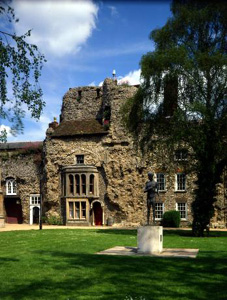
The imposing stone walls, with added towers for catapults, of a Roman 3rd-century Saxon Shore fort. Panoramic views over Breydon Water, into which the fourth wall long since collapsed.
...

This corn mill, whose whole body revolves on its base, was one of many built in Suffolk from the late 13th century. Though milling ceased in 1947, it is still in working order. Climb the wooden stairs to the various floors, which are full of fascinat...
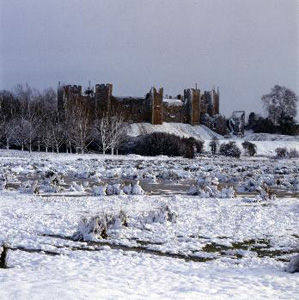
Framlingham is a magnificent example of a late 12th-century castle. Built by Roger Bigod, Earl of Norfolk, the castle, together with Framlingham Mere, was designed both as a stronghold and as a symbol of power and status - as befitted one of the most...
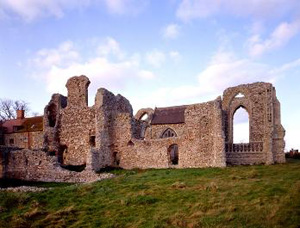
One of Suffolk's most impressive monastic ruins, of a 14th-century abbey of Premonstratensian 'white canons', with a 16th-century brick gatehouse.
...

Discover one of England's most complete and unusual keeps at this fascinating visitor attraction in Suffolk. The unique polygonal tower keep of Orford Castle, stands beside the pretty town and former port which Henry II also developed here. Orford ...
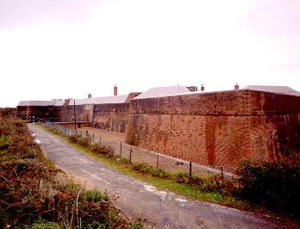
The site of the last opposed invasion of England in 1667 and the first land battle of the Royal Marines. The current fort was built in the 18th century, and modified in the 19th century with substantial additional 19th/20th century outside batteries....
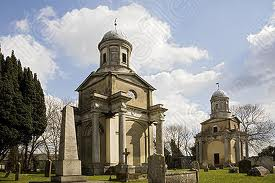
Mistley Towers is defined by two porticoed Classical towers, which stood at each end of a grandiose but highly unconventional Georgian church, designed by Robert Adam in 1776....

The remains of one of the first Augustinian priories in England, founded about 1100. An impressive example of early Norman architecture, built in flint and reused Roman brick, the church displays massive circular pillars and round arches and an el...

The banks and ditches of a series of late Iron Age defences protecting the western side of Camulodunum - pre-Roman Colchester. There are also many pre-Roman graves hereabouts, including Lexden Tumulus, allegedly the burial place of the British chieft...

This elaborate pinnacled 15th-century gatehouse, in East Anglian flushwork, is the sole survivor of the Benedictine abbey of St John. It was stormed by Parliamentarian soldiers during the Civil War siege of 1648....

Church of the Holy Sepulchre is the only surviving remains in England of a priory of Canons of the Holy Sepulchre, who aided pilgrims to Christ's tomb: the ruined nave of their 14th-century church, later used as a barn. Thetford Priory is within ...
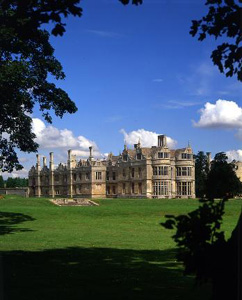
Kirby Hall is one of England's greatest Elizabethan and 17th-century houses. Begun by Sir Humphrey Stafford in about 1570, it was purchased six years later by Sir Christopher Hatton, one of Queen Elizabeth's 'comely young men' and later her Lord Chan...

The Chester Castle: Agricola Tower and Castle Walls has its original gateway to Chester Castle, this 12th-century tower houses a chapel with exceptionally fine wall paintings of c. 1220, rediscovered in the 1980s. An access stair to the castle's wall...

Chester Roman Amphitheatre is the largest Roman amphitheatre in Britain, used for entertainment and military training by the 20th Legion, based at the fortress of 'Deva' (Chester). Excavations by English Heritage and Chester City Council in 2004-5 re...
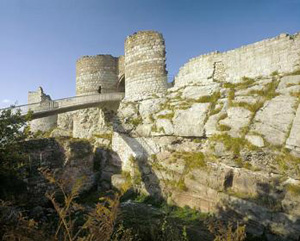
Beeston Castle in Cheshire Stands majestically on a sheer rocky crag, Beeston has perhaps the most stunning views of any castle in England. Excavations indicate that a Bronze Age settlement and Iron Age hillfort occupied the site long before the cast...

The two massive Saxon stone crosses, elaborately carved with animals and Biblical scenes including the Nativity of Christ and the Crucifixion, dominate the cobbled market square of Sandbach. Probably dating from the 9th century, and originally painte...

The delightful village of Castle Acre boasts an extraordinary wealth of history. Situated on the Peddar's Way, a major trade and pilgrim route to Thetford, Bromholm Priory and Walsingham, it is a very rare and complete survival of a Norman planne...

Creake Abbey is the ruined church of an Augustinian abbey, reduced in size after fire and plague....

Cow Tower is one of the earliest purpose-built artillery blockhouses in England, this brick tower was built in c. 1398-9 to command a strategic point in Norwich's city defences....
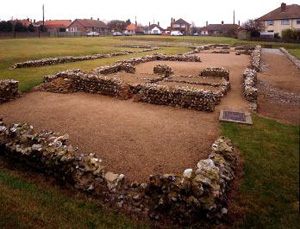
Caister Roman Site is the partial remains of a Roman Saxon Shore fort, operating in partnership with Burgh Castle, including wall and ditch sections and building foundations....

Monk Bretton Priory are the substantial ruins of a Cluniac monastery, with an unusually well-marked ground plan, an almost complete west range and a 15th-century gatehouse....

Wetheral Priory Gatehouse is a 15th-century gatehouse of a Benedictine priory, where wrongdoers could claim pardon if they enlisted to fight the Scots. Wetheral Priory Gatehouse survived because it later served as the vicarage for the parish churc...

Standing close to Hadrian's Wall, the Augustinian priory of Lanercost was much involved in the Anglo-Scottish wars. During his last campaign in 1306-7 the mortally sick Edward I rested here for six months, before dying as he prepared to enter Scot...

This 15th-century tower, sole survivor of the manor house of the Wybergh family, was plundered by Jacobites in 1745 before the Battle of Clifton Moor, the last battle fought on English soil....

The mainly 15th-century remains of a castle begun by Bishop Strickland of Carlisle and developed by the Nevilles and Richard III. Set in a municipal park opposite the railway station....

A large and impressive Neolithic henge, much better preserved than neighbouring King Arthur's Round Table. Its banks stand up to 3 metres (10 feet) high, and unusually are constructed of pebbles collected from the nearby river. Near the centre is a s...

A Neolithic earthwork 'henge', dating from c. 2000 BC, but much later believed to be King Arthur's jousting arena. Mayburgh Henge is adjacent....

Shap Abbey is an impressive full-height 15th-century tower and other remains of a remote abbey of Premonstratensian 'white canons'....

Guisborough Priory are the ruins of an Augustinian priory founded by the Bruce family, afterwards Kings of Scotland. They are dominated by the dramatic skeleton of the 14th-century church's east end....

Chesters Roman Fort in Northumberland was built to guard the Roman bridge which carried Hadrian’s Wall over the River North Tyne. It has the best preserved remains of a cavalry fort in Britain. Explore the foundations of the headquarters building a...

Immerse yourself in 1930s Art Deco decadence at Eltham Palace, one of the most enchanting visitor attractions in London. Built by the wealthy Courtauld family next to the remains of Eltham Palace, childhood home of Henry VIII, it’s among the finest...

Marble Hill House is the last complete survivor of the elegant villas and gardens which bordered the Thames between Richmond and Hampton Court in the 18th century. It was begun in 1724 for the remarkable Henrietta Howard, mistress of King George I...

Ranger’s House is an elegant Georgian villa in Greenwich Park which houses The Wernher Collection, a remarkable collection of works of art amassed by diamond magnate Sir Julius Wernher (1850-1912). Arranged within the panelled interiors of this...

Wellington Arch is set in the heart of royal London at Hyde Park Corner, Wellington Arch was built in 1825-7 as part of a campaign to improve the royal parks. Intended as a victory arch proclaiming Wellington's defeat of Napoleon, it is crowned by th...

Addresses don’t come much grander than 'Number One London', the popular name for Apsley House, one of the most interesting visitor attractions in London. Home to the Duke of Wellington after his victory over Napoleon at Waterloo, the interior of th...

The Jewel Tower dates back over 700 years and is an intriguing visitor attraction in the heart of Westminster. It was built around 1365 to house Edward III’s treasures and was known as the ‘King’s Privy Wardrobe’. One of only two building...

House dating from 1580s with C18 and C19 alterations. Requires a new roof, as the roof structure is rotting, also repair of the timber frame and brickwork is needed. Due to the condition of exterior, the interior is very vulnerable. Ravaged by fire i...

One of the best-preserved milecastles on Hadrian's Wall, Poltross includes an oven, a stair to the rampart walk, and the remains of its north gateway....
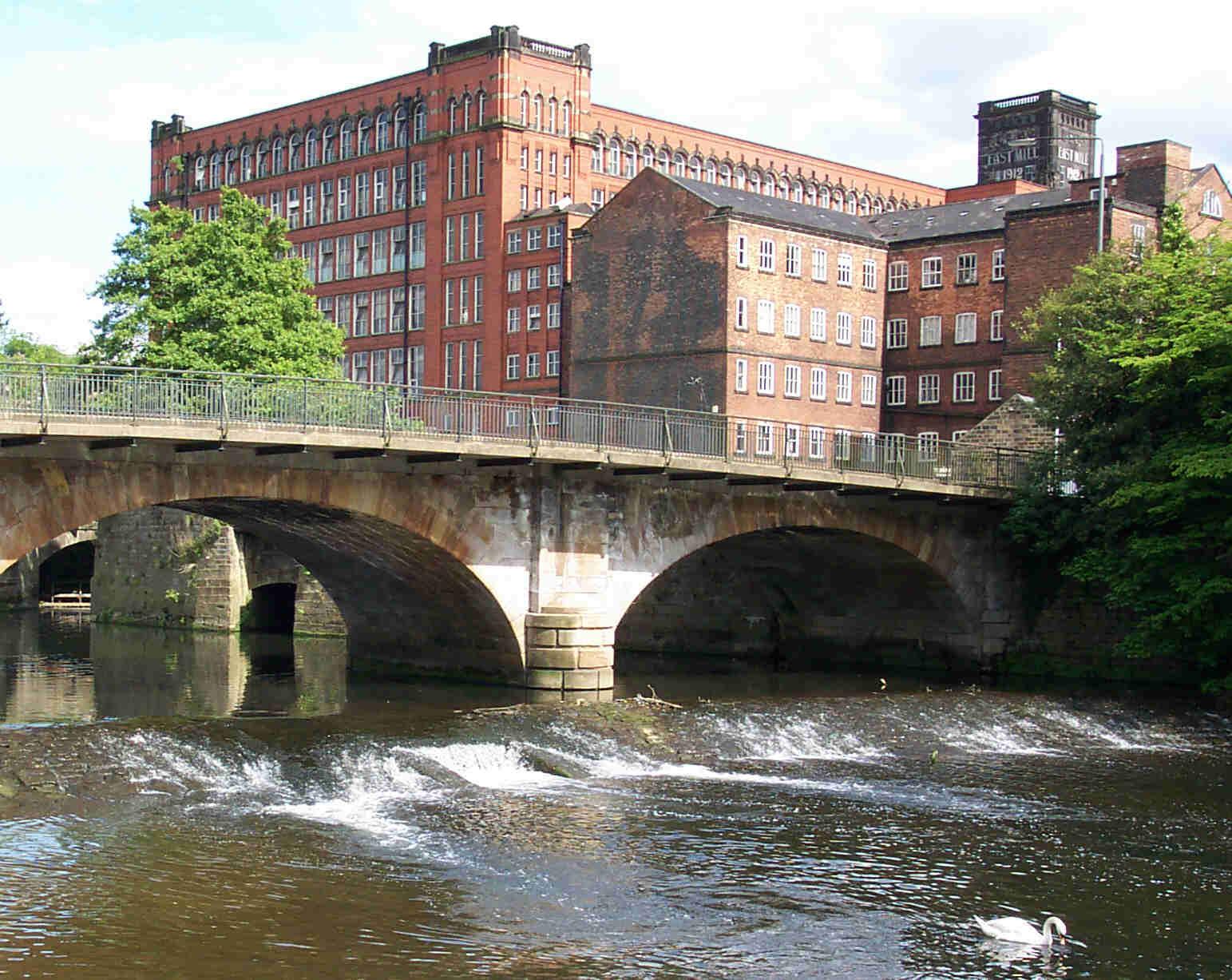
Strutt's North Mill, Belper is a museum and visitor centre housed in Belper North Mill. The Museum was founded in 1996 with the aim of preserving the local heritage of cotton spinning and other local industries. The collection comprises of mach...